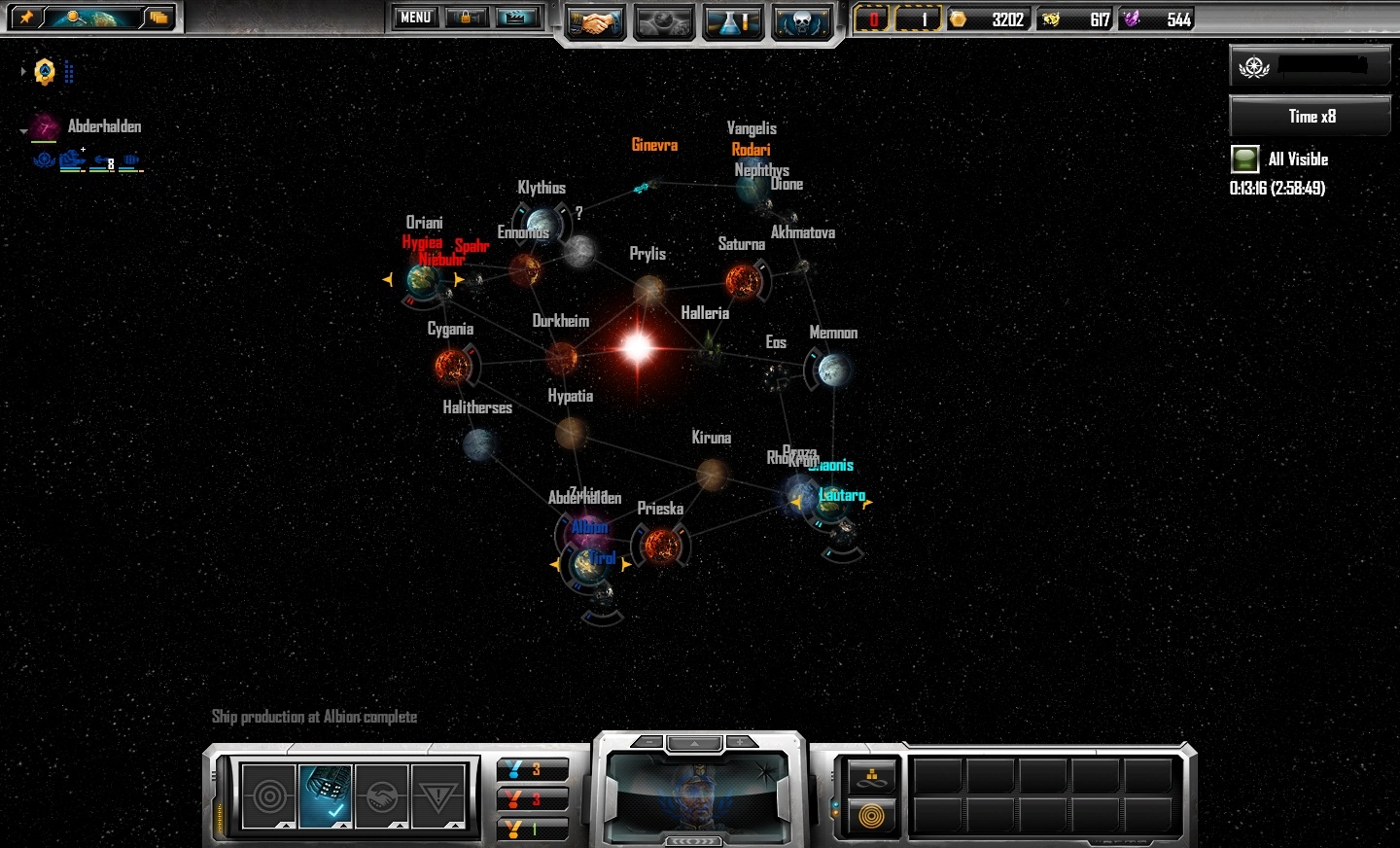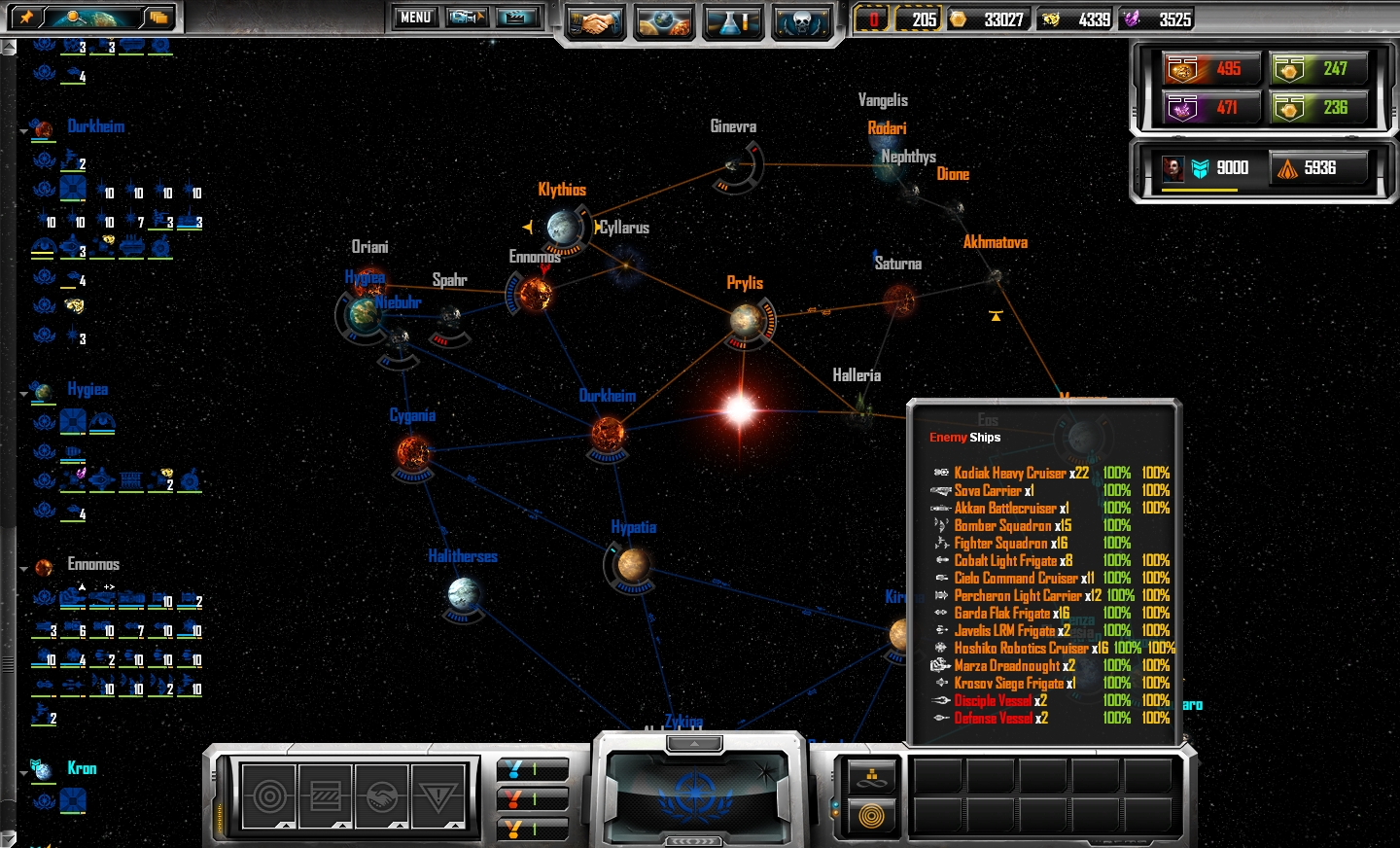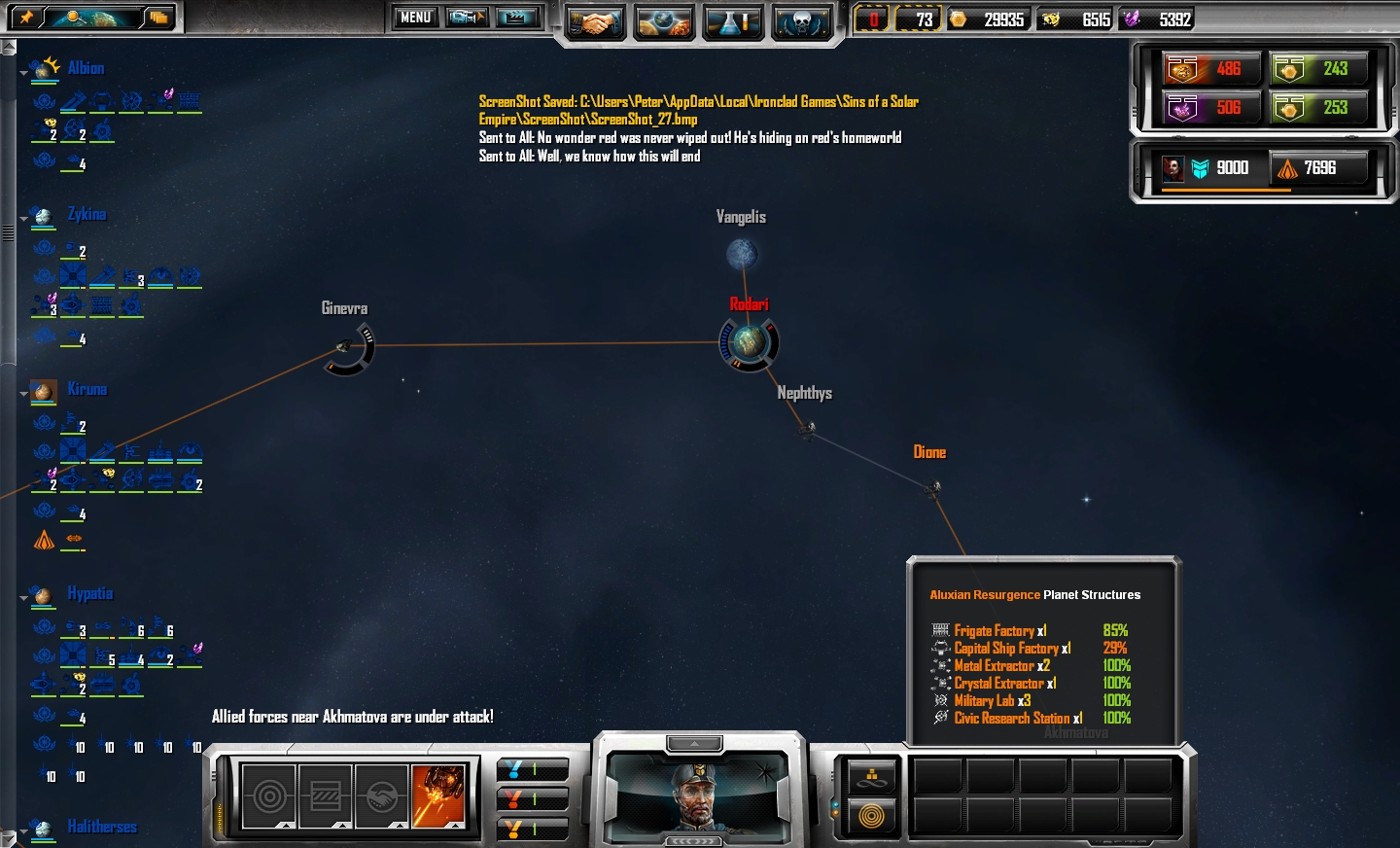I’m pleased to present this blog’s first cooperative after-action report (AAR)/Let’s Play (LP)! For today’s post, The Stompers of Comps #1, we played one of my preferred timekillers, a polished and, I’m glad to say, profitable space-opera RTS from a small developer that punched well above its weight.
The game: Sins of a Solar Empire, with the Diplomacy expansion.
The rules: Two human players versus two Hard AI players. Locked teams. Diplomatic victory DISABLED.
The teammate: Josh.
***
Peter (dark blue): Josh and I both played the same faction, the TEC – Traders’ Emergency Coalition. However, the “T” might as well stand for “Terran”, because the TEC is the vanilla human race of a thousand space operas. While its fleet is somewhat generic, the TEC does have some interesting abilities. It can build income-boosting trade ports earlier in the game than any other species. And in the late game, it can eventually construct Novalith cannons, superweapons capable of depopulating a world in two shots from across the length of the map. These two points will become important to my strategy.
Josh (light blue): The start of the game looked promising. To my north was a nice big Arctic planet by the name of Memnon with four crystal mines ripe for use. My west held another two arctic planets with as much crystal between them. All this crystal around me, and only a sliver of metal available for me to use. I could see the crystal market constantly crashing in this game, as I sold the stuff off to keep myself lined with metal. No matter, I thought. The scout ships set out to see what was happening and I came to quickly realise that Memnon was nice and close to the pirate base, and to the opposition. This would be a fairly hard chokepoint to manage, and Memnon looked to be the locus of what would be my new empire.
Peter: My plan was to push as hard as possible early on to stake out a defensive line, then dig in (in RTS parlance, “turtle”). Behind the resulting shield, the TEC’s trade ports would allow me to build up a superior economy and eventually, crush the computer with sheer weight of numbers (“boom”). Soon enough, the outline of a good defensive position came into view. If I anchored the planets Halitherses and Hypatia to the west, and Josh held Memnon to the east, we’d be set to laugh at the computer players beyond the wall: Red to the northwest, near my worlds; and Orange to the northeast, near Josh.
Josh: Memnon was mine, as were the crystal mines, happily churning out crystal. In front of me was what looked like a booming crystal trade. “I’m gonna be filthy rich!” I thought. How wrong was I…
Peter: In Sins of a Solar Empire, players can use their cash to place bounties on each other, and every ten minutes, space pirates will sortie from their base to attack whoever has the highest price on his/her head. For most of the game, Josh and I fed the pirates a steady stream of cash, keeping them off our backs and ensuring they’d burden the computer players instead. But this isn’t foolproof, because the computer just loves to increase the bounty in the last few seconds before the pirates blast off. And this was exactly what happened next.
Josh: Normally at the start, the pirate fleet in my experience is laughable. But not this time. This fleet was significant. By significant, I mean they effectively destroyed my whole fleet, with the exception of my capital ship. They went straight to my home planet, and I was forced to follow. And the AI, in its ever-omniscient state, descended upon poor undefended Memnon. But the priority for me was my capital planet. In 15 to 20 minutes, I was able to whittle down the pirate fleet and eventually drive them out. But all the money that should have gone towards research and expansion was instead spent on getting ships out to save the homeworld and replacing my losses. So it should come as no surprise that, when I looked to re-take Memnon, I was easily driven back. My economy was in tatters. Metal and credits were only trickling in. Crystal from my other surrounding arctic planets tried to keep me afloat, but buying metal is downright expensive. Ships needed that metal. And I needed ships to take planets and get an economy. What a vicious spiral I was in.
Peter: My own early game went much better than Josh’s. I pushed back the Red computer player to the defence line I’d identified early on, and my trade ports began to go up. Soon, my coffers were filling fast enough for me to begin constructing a chain of starbases, the mighty fortresses introduced in a previous expansion pack. Unfortunately, the computer was also building starbases. The prospect of a stalemate loomed. Then, just as I’d hoped, Red overreached itself. The Red fleet came boiling in to attack my starbase and defending fleet head-on. When the dust settled, Red’s forces had been gutted. Red’s own border starbase had been weakened by a pirate attack. Josh had a fleet on the way to back me up. It was time to go onto the offensive.
Josh: We grabbed a world, Durkheim. A nice, lava-filled world complete with metal mines. My eyes lit up. Could I get a colony ship there? Unfortunately, I was unable to hold the planet and had to beat a hasty retreat. That included my level 6 capital ship retreating via the pirate base… Yep, it was toast. As if on cue, the Orange guys came back into the fray. My capital looked like a nice planet based on the few skirmishes we’d had. Now they were serious. I think I was close to rolling into a ball and moaning.
Peter: Josh and I smashed up most of Red’s empire, even its homeworld. But we couldn’t hold our gains. Red’s forces were regrouping and counterattacking. In the end, I was able just to grab the single world of Cygania before I had to call off the raid and send my fleet to help Josh hold his homeworld.
Josh: My capital planet was left as a bombed-out ruin. This was the first time the apocalypse hit. Oh yeah, I will lose my capital planet many times over before the match is close to being won. Thankfully the aggressors were beaten back, and Peter got some nice experience for his capital ship. I was back to square one and had to console myself. Looking at my situation, my priority was to focus on getting defences back up. Oh, and I’ll worry about that orange line surrounding my capital later. Culture-spreading broadcast towers were the least of my worries right now.
Peter: Sins of a Solar Empire works a little bit like some of the later Civilization games as well as Galactic Civilizations II: building up culture around an enemy planet will eventually push it into neutrality. In game terms, this removes any settlement there from the map. Normally, this is more of an annoyance than a serious threat. But when the culture push is coming straight at one’s homeworld…
Josh: That culture had been wearing away my populace’s love towards their somewhat strategically unsound leader, and, weary of being bombed to bits either in space or from space, they chose to join the other team. My capital, lost. My asteroid to the south, lost. Suddenly, the hole I was in felt much deeper. No colony ships to reclaim the planets, or any metal production either. And thus began my Plan B. Devote some resources to building a new shipyard, get a colony ship out and reclaim my rightful planets. And get some broadcast towers up.
Peter: Red’s fleets had driven back my earlier attack and Josh was hard-pressed on the eastern side of the map. I started doubting whether I’d win this game through a conventional military offensive. That left plan B. Remember the Novalith cannon, the planet-busting apex of TEC research? Well, I had plenty of time to make my way up the tech tree, and plenty of money to fund my research.
Josh: Soon, the people were happy yet again. I guess anyone would be when they move from an arctic planet to a nice temperate planet. But no sooner were they in their nice new homes than they were running for their lives. When the AI failed to hold a planet by peaceful subversion, it sent in the fleet and did a good job using more violent means. My capital planet lost yet again, bombed to pieces. My asteroid planet gone too for good measure. Suddenly the hole felt very cold. Two planets left, each one a nice little chunk of frozen rock with crystal income only. I’d been kicked back yet again, beyond square one. “Someone kill me already,” I thought. Then came the Novaliths. Peter’s Novaliths.
Peter: In short order, my rivers of gold allowed me to build not one, not two, but three Novaliths. “The Novalith Cannon will always get through,” I thought, echoing pre-World War 2 airpower evangelists. “Now all I have to do is wait for the victory screen to pop up.” Secure behind my still-intact defences and confident in my inevitable triumph, I sent my battle fleet to help Josh reclaim and then fortify his capital.
Josh: I was able to rescue my two lost planets. Starbases were built to stave off further attacks, and my dire situation suddenly got a little bit more manageable. Finally I could assemble a fleet, and try once more to reclaim Memnon. I was not successful, but I did at least give them a rude finger gesture and blow up the starbase guarding it before retreating yet again.
Peter: The Novaliths fired shot after shot, and planet after enemy planet was (temporarily) reduced to radioactive ash. I knew I must be savaging the computer players, since even Josh’s battered economy was pulling ahead of theirs. But the victory screen refused to come up. Even though I built more and more Novaliths in an attempt to break the stalemate, so far as I could see, nothing happened on my end of the game for the next hour or so. Eventually, it became clear that I’d have to send in the fleet to administer the coup de grace. And when I did, the fall of Red became an anticlimax – the outgunned Red fleet simply ran away, Red’s starbases turned out to be no match for my armada, and soon my flag flew over what was once the Red homeworld.
At this point, we took a break from the game for a couple of days. After we resumed, I mopped up the remnants of Red, at which point the game looked like this:
Peter: Given that Red’s resistance had pretty much evaporated once I’d stopped waiting for the Novaliths and just sent in the fleet, I came up with a new plan. Orange’s main fleet at Prylis was still dauntingly large, but it couldn’t be everywhere at once. My fleet would simply bypass Prylis in favour of carving a swathe of destruction from Klythios to the Orange worlds at the top right-hand corner of the map. Where a planet was too heavily defended for my fleet to do the job, well, I still had my ridiculously large, and still growing, battery of Novaliths.
Josh: Upon reloading, I bore witness to how bad things looked from my end. I pulled together one more fleet. “One last blast,” I thought. “Do or die, I have to push ahead.” Money not spent on ships went towards the bounty, a veritable pack attack against my troublesome Orange neighbour. Peter seamlessly strode from planet to planet, and that was my own invitation to dive in and have one final stab at Memnon.
Peter: Much like the final assault against Red, the campaign against Orange turned out to be an anticlimax. The main Orange fleet never intervened, and the smaller detachments I faced were no match for me. Soon enough, I shot my way through to the Orange homeworld of Rodari, only to be startled when I found it was actually controlled by the Red player. So THAT’S where the last Red remnants had been hiding all along! Red must have moved in after my Novaliths blasted Orange off the surface of the planet. But their sanctuary was only temporary. Soon enough, my fleet cleared Rodari of enemies, Red, Orange, or otherwise. There was still no victory screen, and I couldn’t find any other enemy planets left, but I did notice that it had been a very, very long time since I’d been able to get a scout through to Vangelis, in the very corner of the map…
Josh: And I was successful! Memnon was mine, yet again! Suddenly, things were looking up. I was on a high. I could actually do something now. I could build a fleet, conquer worlds, build cannons, research technology. Even, dare I say, attack the pirates head-on for the grief they gave me early game. All these wonderful things I could do, off-limits during my intergalactic financial crisis. I could actually help win this rather than being the one-legged man in a veritable arse-kicking contest….
Peter: My fleet jumped to Vangelis, and sure enough, Red had a tiny outpost there (after the game, I found out my Novaliths had been auto-targeting the planet notwithstanding I hadn’t scouted it in ages). Well, this was the end of the line. I selected my Novaliths, targeted the planet, and opened fire.
Josh: Then all of a sudden the game over screen came up. We had won. Damn, that was sudden. But heck! We won.
Peter: The really interesting revelations came after the game was over, when I looked at the statistics screen. Many a defeated general in the last two hundred years would be unsurprised at the course that the game took. Right up until the end of the game, the Orange player’s fleet outgunned mine on paper, meaning it was lucky that I bypassed it instead of fighting it head-on. But from very early on (less than 1/3rd of the way through), I had the #1 economy in the game. Meanwhile, the Red player’s economy never recovered from the damage wreaked by my/Josh’s joint raid early on. And while my extravagantly expensive Novaliths weren’t enough to win the game by themselves, once I’d built enough (about six), they kept both computer players in near-perpetual beggardom. I suspect if I’d played more aggressively, I could have ended the game much earlier – even if I’d taken heavy losses, I could have easily replenished my ranks while Orange and Red would have struggled to do the same. Ultimately, the moral of the story was old, but as valid as ever: “Money is the sinews of war.”
Discover more from Matchsticks for my Eyes
Subscribe to get the latest posts sent to your email.



